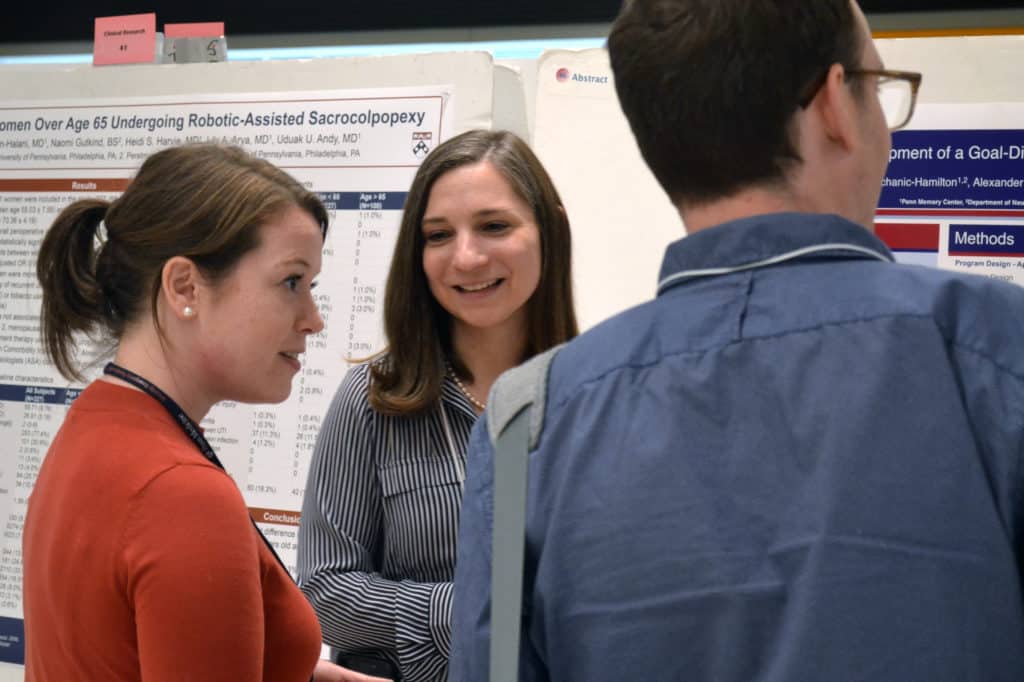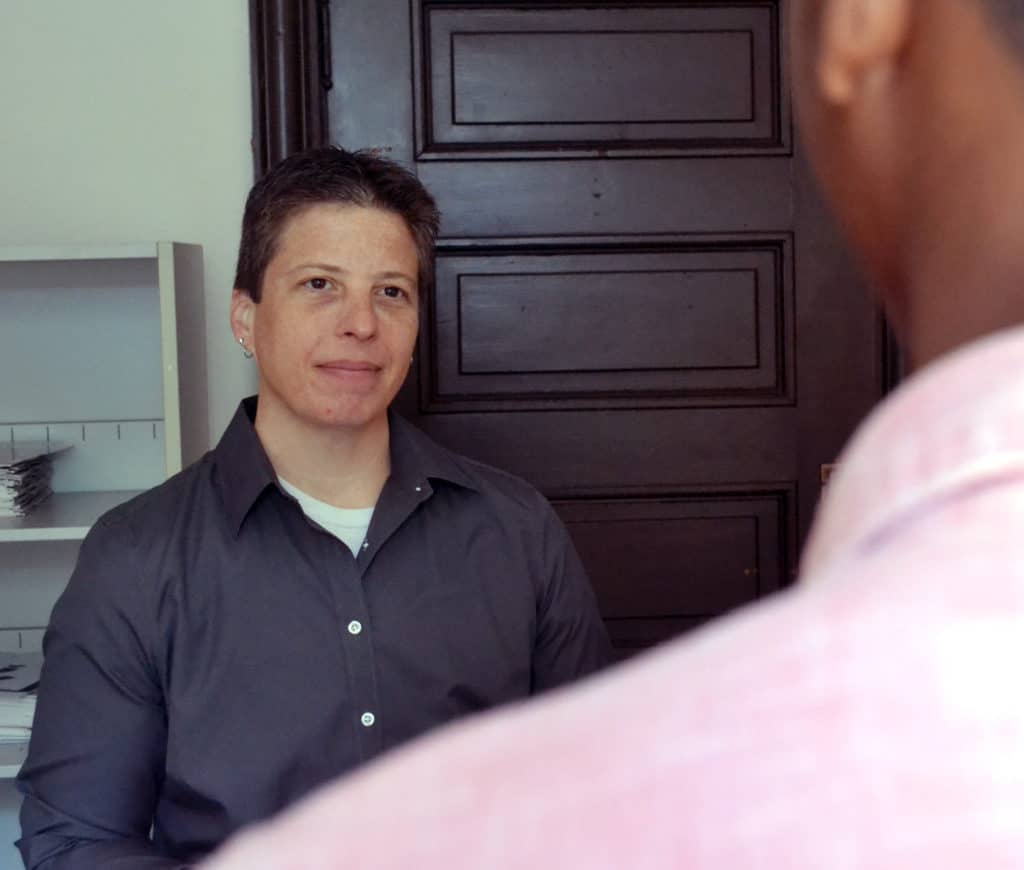
By Sharnita Midgett
Looking over the top of her seafood menu, Rosemary Browne wondered what would happen if her mother tried to order alone.
“Mom,” she asked, “do you want a crab cake?”
The questions always sought a yes-or-no answer. Open-ended questions simply drew attention to the fact that Carolyn, her mother, could no longer order off the menu by herself.
Ever since Carolyn’s diagnosis of Alzheimer’s disease, how she interacted with the public had started to change, and it made Browne picture the struggle of her mother trying to order without knowing her options.
Browne and family members first noticed Carolyn’s memory problems in familiar places, like at her favorite restaurants and traveling to the Jersey Shore. At the same time, Browne believes, these troubles were also noticed by Carolyn’s employers as she approached 80 years of age.
“They were letting people go, and that was their opportunity to let her go,” she said.
Though Browne, now 66, does not currently have any cognitive complaints, she says she is “hyper-aware” of stigma in the workplace and thinks about it as she begins working as a substitute teacher. She wonders: If she were to notice some decline in her own cognition, would she tell her employer?
Assumptions that are made about people diagnosed with Alzheimer’s disease can lead to stigma, and discrimination in the workplace is one of the biggest concerns of some people affected by Alzheimer’s. The stigma associated with Alzheimer’s disease can cause psychological and social challenges for patients and their families, and it can affect both how a patient and caregiver react to the diagnosis and how others might treat them.
Penn Memory Center Scholar Shana D. Stites, PsyD, MA, MS is a clinical psychologist and researcher studying Alzheimer’s disease stigma in an attempt to understand and reduce it.
“Sometimes people worry, ‘Will I make a mistake?’ ‘Will I be able to do what is asked of me? ’ And from the employer point of view, or collegial point of view, ‘Will my colleague be able to do the work and keep the pace and not make mistakes?’” Dr. Stites said.
In an article published in the Journal of the Alzheimer’s Association, Dr. Stites and colleagues reported results from a study of the beliefs, attitudes, and expectations that people in the general public associated with Alzheimer’s disease dementia. A random sample of 317 adults from the U.S. public were analyzed to understand reactions toward a man with mild-stage Alzheimer’s disease dementia, resulting in over half of the respondents expecting the person to be discriminated against by employers and be excluded from medical decision-making.

About half of survey-takers expect that disclosing a diagnosis of Alzheimer’s disease would lead to being discriminated against by employers and be excluded from medical decision-making.
“Of course there is an element of reality to that, as someone who’s experiencing cognitive decline, may in fact make more errors. There may come a time when they won’t be able to complete their jobs as initially described in their responsibilities,” said Dr. Stites. However, Dr. Stites believes “there’s a line drawn between realistic fears in job performance and jumping the gun with preemptive firing and discrimination.”
This holds true in the story of Wendy Mitchell, who wrote an opinion piece in the New York Times describing her experience of announcing her diagnosis to her employer. She wrote, “I had a file an inch thick with suggestions for how I would be able to keep my job as an administrator with the British National Health Service, one I had loved for more than 20 years.” Though her colleagues were willing to make accommodations for her to ensure that she could reach the full potential of her work, her manager was not. She was asked, “How long have you got?” and her manager gave her eight months to retire.
This case is not isolated and has affected several people who reveal their diagnosis. Alison Lynn, LSCW, MSW, Associate Director of Social Work at the Penn Memory Center, has met some of these people throughout her work.
Though there are several outcomes for those diagnosed with Alzheimer’s disease and who want to continue working, “you have some people who are forced out of their job,” she said. She said that patients ask her, “Should I tell my boss?” and she tells them that she cannot answer that question for them.

Allison Lynn, Associate Director of Social Work (left), discusses Penn Memory Center research with Dr. Dawn Mechanic-Hamilton.
“They know the culture of their workplace better than I do.” She added, “I think it really depends on your workplace culture, who you have told, how impaired you are.”
For those who have lost employment, Lynn says the social work team approaches the situation as a form of grief. “For some people, a job is a part of their identity.”
However, one Penn Memory Center patient had a unique experience that had been covered by several news outlets.
Jeffrey Draine, PhD, MSW, taught graduate social work classes at Temple University after revealing his diagnosis. He was supported by the administration, and he was allowed to be assisted by a communications student.

Penn Memory Center (PMC) Executive Director Felicia Greenfield appeared on NBC10 for an interview with PMC patient and former Temple University professor Jeff Draine.
He had been a professor of Social Work at the University of Pennsylvania and then became chair of the School of Social Work at Temple University. “He was a lifelong advocate of people with conditions that are stigmatized,” said his wife, Deb Dunbar, MSN, CRNP, ANP-BC. “Most of Jeff’s work was in the field of incarceration and mental illness, which are pretty stigmatized human conditions. I think a lot of his work was around trying to destigmatize certain things or at least demystify those things.”
Dunbar believed that Dr. Draine was motivated to continue teaching and disclose his diagnosis to his class and employer because “it was an opportunity for him to set a personal example of what it means to have a condition which is somewhat stigmatized and to role model the bravery that goes with revealing that diagnosis and then continuing to work and asking for accommodations.”
Dunbar called Dr. Draine a trailblazer, as the faculty at Temple University never had a request for accommodations for a professor with a cognitive disability. She believed it was an opportunity for Dr. Draine to open the doors for the next person.
In reflecting on his experiences in the Philadelphia Inquirer, Dr. Draine said that he “was pleased that Temple was seen as an employer where someone could raise this issue and expect that people would listen and try to figure out what was going on with him.” He added, “Often there’s a fear that no one will understand.”
In her research, Dr. Stites has found that expectations about the future can drive stigma. Specifically, when members of the general public believe the condition of a person with Alzheimer’s disease will improve or stay the same over time, they reacted in ways that were less stigmatizing toward that person as compared to others who believed the person’s condition would worsen. According to Dr. Stites, this is worrisome. Alzheimer’s disease has no therapy to slow its progression, raising the chance that those diagnosed will face stigma.
It is important to understand what people with Alzheimer’s disease are at risk for and what types of policy might be needed to reduce or even eliminate stigma. Dr. Stites believes that “to make advances in diagnosis and treatment of Alzheimer’s disease, we need to participate in research. If people are fearful of participating in research because they fear discrimination, then we need to get policies and education in place to mitigate this.”
According to the Job Accommodation Network’s 2012 Accommodation and Compliance Series focusing on employees with Alzheimer’s disease, the Americans with Disability Act (ADA) does not have a list of medical conditions that constitute a disability, but instead has a general definition of requirements a person must meet to qualify. This means that some people with Alzheimer’s disease will be covered under the act and some people will not. The ADA is a civil rights law that protects individuals with disabilities from discrimination in jobs, schools, transportation, and all places open to the general public.
In the example of Browne and her mother’s interaction at restaurants, Browne thought to herself that the “outside world doesn’t understand that there could be people that sit in your restaurants who can’t read a menu and don’t understand.” Society’s role at large in the discrimination that people face can inform employers’ perspectives of groups of people.
Dr. Stites said, “We’d like to say as a society that discrimination is not okay.”
In some points of views, the employer is seen as someone capable of his or her job and wanting to be free of any liability that may occur down the road. Questions that arise are: Are people who are diagnosed capable of making the decision to still work for themselves? Are they aware of the situation? And what is the role of the employer in making that decision for them? Dr. Stites noted that there is an element of ageism in our society, which could mean some people might be willing to accept discrimination in the workplace.
The question remains: if one wishes to continue working and has the capability, how does one approach employers after diagnosis?
The Job Accommodation Network offered a series of accommodations ideas such as using voice recordings to record verbal instructions, use color-coding, minimizing clutter, using symbols instead of words, and dividing larger tasks into smaller tasks. The Alzheimer’s Association recommends that individuals talk to their physicians and caregiving teams about how their symptoms will impact their work. They suggest that those who learn that they are able to keep working create a transition plan with their employers, such as reducing hours or taking on a less demanding role. It is also important to educate employers about the disease when discussing the future.
Dr. Stites shared a similar sentiment.
“If they could go to their employer without fear of terminated employment or being forced into early retirement, and have that conversation, that would be a great starting place,” Dr. Stites said. “But I suppose, rightfully so, that we’ve seen in people’s experiences, there’s a fear of going and having that conversation.”
